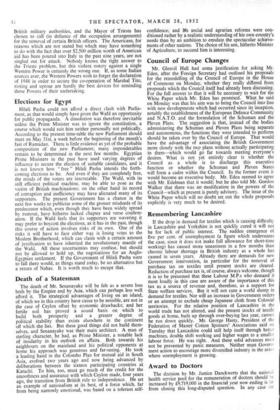Remembering Lancashire
If the drop in demand for textiles which is causing difficulty in Lancashire and Yorkshire is not quickly cured it will not be for lack of public interest. The sudden emergence of five per cent. of unemployment (a figure which understates the case, since it does not make full allowance for short-time working) has caused more uneasiness in a few months than chronic labour shortage in British industry as a whole has caused in seven years. Already there are demands for new Government intervention, in particular for the removal of purchase tax on textiles until present stocks are cleared. Reduction of purchase tax is, of course, always welcome, though it is to be presumed that these Labour M.P.s who demand it most loudly in this case are aware of the importance of this tax as a source of revenue and, therefore, as a support for State welfare services. But it will not cure a world slump in demand for textiles. Nor will an increase in Government orders or an attempt to exclude cheap Japanese cloth from Colonial territories. For the relative position of Lancashire in the world trade has not altered, and the present stocks of textile goods at home, built up through over-buying last year, cannot be run down quickly. Mr. George Hasty, President of the Federation of Master Cotton Spinners' Associations said on Tuesday that Lancashire could still help itself through better machines, double shift working and higher wages to a smaller labour force. He was right.. And these solid advances must not be prevented by panic measures. Neither must Govern- ment action to encourage more diversified industry in the areas where unemployment is growing.


































 Previous page
Previous page